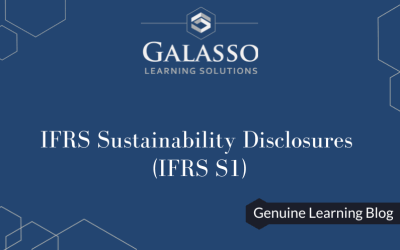Genuine Learning Blog
The Genuine Learning Blog is a video series designed to keep you abreast of the latest developments in accounting and auditing. This is a not a teaser, marketing tool. This blog breaking down new proposals from GASB, FASB, and the AICPA into short manageable videos. Watching this series will make you better informed than your peers!
ITC: International Non-Profit Accounting Guidance Part 2
The ACFE has issued their 2024 Report to the Nations. It provides an overview of fraud schemes as well as an update on the avatar of a fraudster.
2023 National Management of an Accounting Practice (MAP) Survey
The ACFE has issued their 2024 Report to the Nations. It provides an overview of fraud schemes as well as an update on the avatar of a fraudster.
Disclosure and Classification of Certain Capital Assets
The ACFE has issued their 2024 Report to the Nations. It provides an overview of fraud schemes as well as an update on the avatar of a fraudster.
Proposed SSAE to Conform with Quality Management
The ACFE has issued their 2024 Report to the Nations. It provides an overview of fraud schemes as well as an update on the avatar of a fraudster.
OMB Proposes Changes to the Uniform Guidance
The ACFE has issued their 2024 Report to the Nations. It provides an overview of fraud schemes as well as an update on the avatar of a fraudster.
Q3 2023 in Review
At the end of July, the FASB proposed new disclosure requirements that would require public business entities to provide more disaggregated data around their income statement expenses. Unlike the recent income tax disclosure proposal, this proposal only impacts public business entities. It is in response to a request from investors to provide more granular information to assist users in understanding the company’s cash flows. Comments are due October 30.
FASB’s Investor Outreach Report – 2022-2023
The ACFE has issued their 2024 Report to the Nations. It provides an overview of fraud schemes as well as an update on the avatar of a fraudster.
Revisions to OMB Guidance for Grants and Agreements
OMB has updated regulations with respect to the domestic preferences provisions in the Build America, Buy America Act of the Infrastructure Investment and Jobs Act. The updates come after public comment was sought. The effective date for the revised guidance is...
Concept Stmt: Chapter 5, Recognition and Derecognition
In August, the FASB issued Chapter 5 of the Conceptual Framework, Recognition and Derecognition. The chapter addresses the criteria that would be used to determine when an element should be recognized in the financial statements. As concept statements are not...
Concept Stmt: Chapter 2, The Reporting Entity
The FASB has issued a new Concept Statement around the Reporting Entity. While concept statements are not authoritative GAAP they are the theory that underlies GAAP used by the board to develop ASUs.If you are looking for more great content, consider our Webcast...
IFRS® Taxonomy, Sustainability Disclosure Taxonomy
The International Sustainability Standards Board (ISSB) has proposed a Sustainability Disclosure Taxonomy. The proposal addresses a taxonomy for the disclosure requirements in IFRS S1 and IFRS S2 to facilitate digital reporting of sustainability-related financial...
FAF Annual Report
Each year like many nonprofits, the FAF issues their annual report and posts it to their website. The FAF provides an excellent overview of the work of both the FASB and GASB boards. 2022 marked the 50th anniversary of the FAF, so this year’s report also includes a...
FASB ED: Disaggregating Expenses
At the end of July, the FASB proposed new disclosure requirements that would require public business entities to provide more disaggregated data around their income statement expenses. Unlike the recent income tax disclosure proposal, this proposal only impacts public business entities. It is in response to a request from investors to provide more granular information to assist users in understanding the company’s cash flows. Comments are due October 30.
FASB ED: Purchased Financial Assets
In June, the FASB proposed changes to the accounting for purchased financial assets. Based on feedback obtained in its post-issuance review of CECL, stakeholders found the guidance on PCD vs Non-PCD assets confusing and unhelpful. FASB is proposing removing the distinction and expanding the accounting for PCD assets to most purchased financial assets. Comments are due August 28.
NOCLAR with ERTC
On July 21, the Office of Chief Counsel at the IRS issued a memorandum to address noncompliance with ERTCs. The memorandum provides responses to various scenarios that employers have been trying to make to qualify as “eligible employers”. Companies have been trying to take advantage of supply chain disruptions during the pandemic to receive tax credits, even though they might not be eligible to receive tax credits. This problem has been placing auditors in uncomfortable situations, as auditors now need to consider NOCLAR with ERTCs as well as revenue recognition issues.
IFRS S2 – Climate-related Disclosures
This week’s Genuine Learning Blog looks at IFRS S2 – Climate-related Disclosures. Issued the same day as S1, these disclosures focus on strategy, governance, metrics and risk management but particularly in relation to climate related risks and opportunities. S2 is effective for annual reporting periods beginning on or after January 1, 2024. Earlier application is permitted as long as IFRS S1 is also applied.
Q2 2023 In Review
The second quarter of 2023 was a slower one for standard setters. We’ll look at the standards that were issued and proposed from April through June of 2023 at the FASB, GASB and AICPA.
IFRS Sustainability Disclosures (IFRS S1)
The International Sustainability Standards Board (ISSB) has issued the first of their new sustainability disclosure standards. The goal is to provide a single, global baseline of sustainability disclosures to enhance the providing of disclosures. This blog reviews S1, General Requirements for Disclosure of Sustainability-related Financial Information, which were issued this past Monday.
Disclaimer: The information contained within this blog is provided for informational purposes only. Viewing this material does not qualify for CPE credit. Additionally, this general knowledge is not intended to substitute for obtaining accounting, legal, or financial advice from a professional accountant with specific knowledge of your organization. Finally, watching this blog and/or subscribing to the newsletter do not create an accountant-client relationship.




















